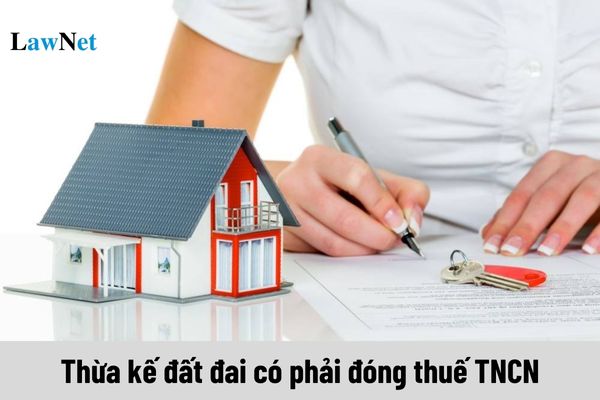Does a daughter-in-law have to pay personal income tax on inherited land from parents-in-law in Vietnam?
Does a daughter-in-law have to pay personal income tax (PIT) on inherited land from parents-in-law in Vietnam?
Pursuant to the provisions of Article 4 of the Personal Income Tax Law 2007 (amended by Clause 2, Article 1 of the Amended Personal Income Tax Law 2012 and supplemented by Clause 3, Article 2 of the Amended Tax Laws 2014) regarding tax-exempt income, it includes:
- Income from real estate transfers between husband and wife; biological parents and biological children; adoptive parents and adopted children; parents-in-law and daughters-in-law; parents-in-law and sons-in-law; paternal grandparents and grandchildren; maternal grandparents and grandchildren; siblings.
- Income from the transfer of housing, land use rights, and assets attached to residential land of an individual if the individual possesses only one house or residential land.
- Income from the value of land use rights granted by the State to individuals.
- Income from inheritance or gifts of real estate between husband and wife; biological parents and biological children; adoptive parents and adopted children; parents-in-law and daughters-in-law; parents-in-law and sons-in-law; paternal grandparents and grandchildren; maternal grandparents and grandchildren; siblings.
- Income of households and individuals directly engaged in agricultural, forestry, salt production, aquaculture, and fishing activities that have not undergone processing into other products or are only ordinarily processed.
- Income from the conversion of agricultural land allocated by the State to households and individuals for production.
- Income from interest on deposits at credit institutions, interest from life insurance contracts.
- Income from remittances.
- Portion of wages for night work and overtime that are higher than daytime wages as regulated by law.
- Pensions paid by the Social Insurance Fund; pensions paid by voluntary pension funds monthly.
- Income from scholarships, including:
+ Scholarships received from the state budget;
+ Scholarships received from domestic and foreign organizations under their educational support programs.
- Income from compensation for life and non-life insurance contracts, compensation for workplace accidents, state compensation, and other compensations as prescribed by law.
- Income received from charitable funds established or recognized by competent state agencies operating for charitable, humanitarian, non-profit purposes.
- Income received from foreign aid for charitable, humanitarian purposes in the form of government and non-governmental approved by competent state agencies.
- Income from wages and salaries of Vietnamese seafarers working for foreign shipping lines or Vietnamese shipping lines engaged in international transport.
- Income of individuals who are ship owners, individuals with the right to use a ship, and individuals working on ships from activities providing goods and services directly serving offshore fishing.
According to the regulation, income from inheritance of real estate between parents-in-law and daughters-in-law is exempt from personal income tax. Therefore, a daughter-in-law inheriting land from her parents-in-law is not required to pay PIT.

Does a daughter-in-law have to pay PIT on inherited land from parents-in-law in Vietnam?Image from the Internet)
What is the time limit for a daughter-in-law to request inheritance confirmation of land from parents-in-law in Vietnam?
Pursuant to the provisions of Article 623 of the Civil Code 2015 on the time limit for inheritance as follows:
Article 623. Time Limit for Inheritance
1. The time limit for an heir to request the division of the estate is 30 years for real estate, and 10 years for movable property, from the time the inheritance is opened. After this period, the estate belongs to the heir who is managing the estate. If there is no heir managing the estate, it shall be resolved as follows:
a) The estate belongs to the person possessing it as prescribed in Article 236 of this Code;
b) The estate belongs to the State if there is no possessing person as prescribed in point a of this Clause.
2. The time limit for an heir to request confirmation of their inheritance rights or to reject the inheritance rights of others is 10 years from the time the inheritance is opened.
3. The time limit to request an heir to fulfill the obligations related to the deceased's estate is 3 years from the time the inheritance is opened.
Accordingly, the time limit for a daughter-in-law to request confirmation of inheritance rights of land from her parents-in-law is 10 years from the date the inheritance is opened.
When is the inheritance opened?
Based on Clause 1, Article 611 of the Civil Code 2015, the time of opening inheritance is the time of death of the person whose estate is involved. If a court declares a person deceased, the inheritance opening time is the date identified in Clause 2, Article 71 of the Civil Code 2015.

